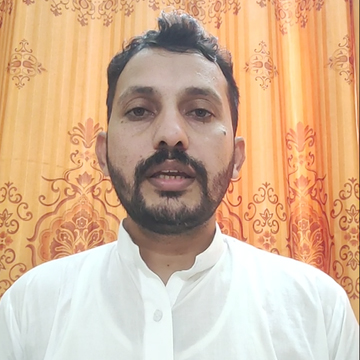
|
|
(Via Video link)
Mr. Rizwan Shahzad
MS Scholar, Department of Education, Sindh Madressatul Islam University, Karachi
Synthesizing on the Accession of Junagadh State with Pakistan
|
| |
|
Junagadh acceded to Pakistan, but Viceroy Mountbatten supported the interests of congress. He preferred All India Congress interests over the British Government's guiding principles of integrity and fairness promised to all princely states at the time of partition. Congress planned to occupy all the princely states by any means because they actually wish to capture and control the lands and recourses of the princely states. Geographical limit imposition by viceroy was merely a propaganda to occupy the majority of the states. India was in fear after Junagadh's accession with Pakistan because congress thought if they did not take any severe action against Junagadh, it may give courage to other states of Kathiawar to accede to Pakistan because Kathiawar was bordering with Pakistan. India cut off all the supplies and deployed army on the borders of Junagadh. With the help of Shamaldas Gandhi and Hindu nationalists, India made a provisional government and started riots in the state. India imposed war on Junagadh in November and its allying states. Due to war devastation and riots, people started migrating from the state. After occupation on 09 November, Hindu nationalists with arms started assaulting Muslims.
|
|
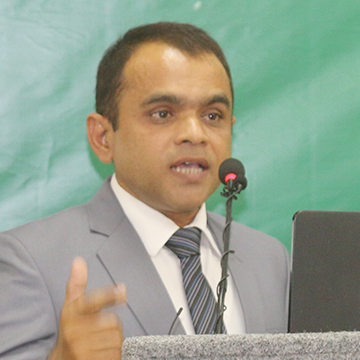
|
|
Rana Pervaiz Iqbal
Ph.D. Scholar, Department of Political Science, The Islamia University of Bahawalpur
Accession of Princely States to Pakistan: A Comparative Study of Junagadh and Bahawalpur
|
| |
|
Accession to Pakistan by the two princely states depicts two different consequences. The new state of Pakistan was in severe need of such units which were rich both economically and socially. Junagadh and Bahawalpur states were two of them. India attempted to make Pakistan alone by the use of force and power in the matter of accession of the princely states. The Bahawalpur accession smoothly completed and the State joined Pakistan and no force could undo it ever. The Nawab of Bahawalpur, Nawab Sadiq Abbasi, extended every possible cooperation to Pakistan being a sincere friend and lover of the newly created country of the sub-continent. In case of Junagadh, the “Instrument of Accession” is still saved and authentic duly signed by the Nawab of Junagadh and Quaid-e-Azam Muhammad Ali Jinnah. It was the result of the fruitful efforts made under the leadership of Quaid-e-Azam to reach an agreement with the Nawab of Junagadh to accede to Pakistan. The decision of joining Pakistan by the Nawab of Junagadh was a great success for Pakistan. India violated the laws and occupied the state of Junagadh. The human rights were acutely violated as the people of Junagadh also wanted to join Pakistan.
|
|
|
|
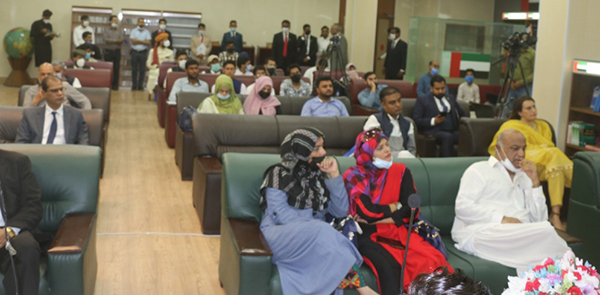
|
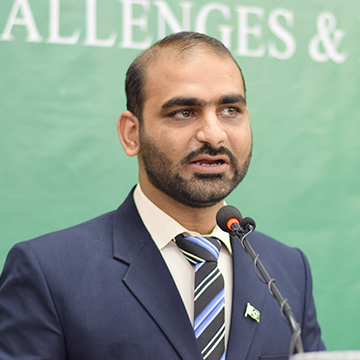
|
|
Mr. Muhammad Mehboob
Dept. of Defense and Strategic Studies, Quaid-i-Azam University, Islamabad
Re-orientation of the new Political Map of Pakistan: A Case Study of Junagadh State Accession
|
| |
|
Unveiling a new Political Map of Pakistan in which Junagadh State is declared as Pakistan’s territory is a highly important step taken by the Government of Pakistan. During SCO summit back on 15th September 2020, member states of the SCO especially China and Russia rejected Indian objections on new political map of Pakistan. The Nawab of Junagadh, Nawab Mahabat Khanji wrote two letters to the founding father of Pakistan Quaid-i-Azam Muhammad Ali Jinnah on 15th and 31st August, 1947, in which he said that we are firm with our decision to accede with Pakistan. On 11th November 1947, Prime Minister of Pakistan Liaqat Ali Khan termed Indian actions as “a clear violation of Pakistan’s territorial integrity and a breach of international law". Junagadh’s geo-strategic location is very important. It has geo-strategic, and geo-economic importance for Pakistan. Pakistan’s military presence in this region can provide better defensive capabilities. Pakistan should build a very strong and official narrative to counter Indian baseless narrative on Junagadh. As government is working on syllabus, like Kashmir issue, Junagadh issue should also be included in the syllabus especially in the textbooks of Pakistan Studies as it was taught in past. At Academic level in universities and think tanks, researchers and analysts should work on new dimensions of the issue of Junagadh.
|
|
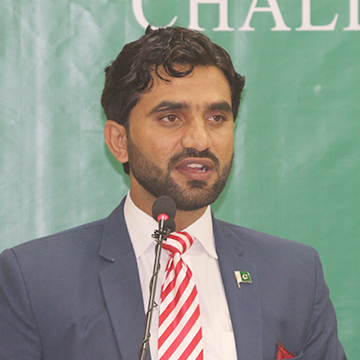
|
|
Mr. Mudassir Ayub
PhD Scholar, Dept. of History, Quaid-i-Azam University, Islamabad
Accession of Junagadh & Kalat States to Pakistan: A Comparative Study
|
| |
|
The comparison of the accession of both states shows that princely states were legally independent to decide about their future. Quaid-e-Azam respected this right of the states. Quaid-e-Azam, therefore, requested Khan of Kalat to accede to Pakistan without using any threat or force. Whereas the state of Junagadh was an independent state. But India did not respect the sovereignty of the state of Junagadh. It was the legal right of the sovereign of the state to join Pakistan or India. But the Nawab of Junagadh was threatened by India to revert his decision of accession to Pakistan. The multi-religious advisory council of Junagadh had decided to accede to Pakistan. In case of Kalat the Darul Umara of Kalat was also not reluctant to accede to Pakistan. It just asked for some time to carefully analyse the terms of accession. It was only Ghaus Baksh Bizanjo who was against the accession. The state of Junagadh was attacked and occupied with force by India. While the state of Kalat acceded to Pakistan without any military action and with his own will.
|
|
|
|
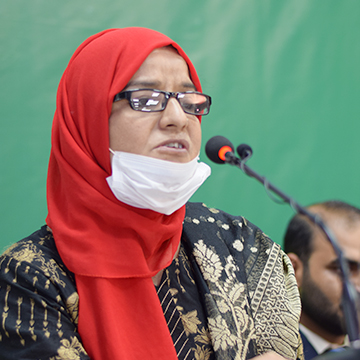
|
|
Dr. Juliyana Usman Wachani
Lecturer, Raunaq e Islam Government College for Women, Kharadar Karachi
Validity of Pakistan’s Claim on the Issue of Junagadh: An Analytical Discussion with the Slight Touch with Kashmir Issue
|
| |
|
Along with other princely states, Junagadh was an economic and administrative part of Kathiawar region ruled by a Muslim ruler Mahabat Khanji. With the consultation of state council comprising of Hindu and Muslims, Nawab of Junagadh jointly signed the Instrument of Accession with Quaid-e-Azam and made Junagadh the first state to accede to Pakistan. For necessary formalities of the accession, Nawab of Junagadh left for Karachi. As soon as Nawab reached Karachi, Indian forces violated the sovereignty of Junagadh. India’s act to enter forces in Junagadh is totally unjust and an acute violation of international law. India violated article 2(4) of international law. India’s claim over Junagadh by a sham referendum is a contrast with the case of Kashmir. India intervened illegally in the affairs of Junagadh against the will of its ruler, thus it challenged the sovereignty of a state under the perspective of international law. Due to his sympathies with India, Lord Mountbatten shifted his motive and declared that only on the base of geographical contiguity, a state could get accession to either of the states. His statement was not in favour of Pakistan. However, the Nawab of Junagadh and ruler of Manavadar decided to accede with Pakistan as Junagadh was not land locked and has sea rout link with Pakistan
|
|
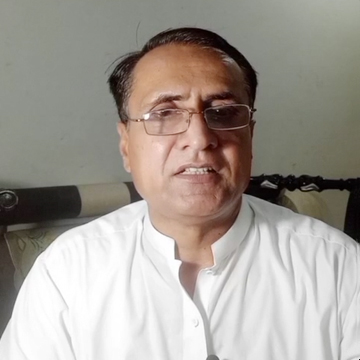
|
|
(Via Video link)
Dr. Muhammad Nawaz Bhatti
Chairman, Dept. of Politics & International Relations, University of Sargodha
Accession of Princely States: A Comparative Study of Junagadh and Jammu & Kashmir
|
| |
|
After the War of Independence (1857), the Government of United Kingdom took over the control of India through Government of India Act 1858. Under that Act, all the agreements and treaties made by the British East India Company with the native princes were maintained. Resultantly, the administration of India was divided into two categories; the provinces were under the direct control of the British Crown through Secretary of State for India whereas the princely states were indirectly controlled by the British Government through native princes. In 1947, India was divided and a new state of Pakistan emerged on the map of the world. The principles on which the partition was agreed upon were that contiguous Muslim majority areas should be separated from non-Muslim majority areas to establish the two independent states, Pakistan and India and the rulers of princely states were authorized to accede to any dominion. The Junagadh, Manavadar and Hyderabad were Hindu majority states with Muslim rulers, acceded to Pakistan (later on occupied by India by use of force) and on the other side Jammu and Kashmir was Muslim majority state with Hindu ruler which was also occupied by India.
|
|
|
|
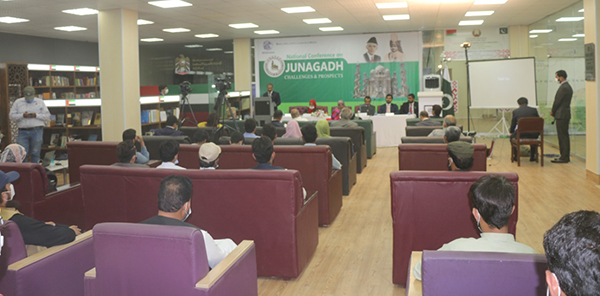
|
|
After the remarks by the speakers, an Interactive session was held and brief summary of the remarks is given below:
|
The Junagadh issue was neglected by Pakistani policy makers for many years. That is why Junagadh was not promoted as compared to other issues like Kashmir. These “Kashmir and Junagadh” issues are two important and different in their nature. In the early years of independence, Pakistan faced many challenges like the 1948 war, political instability, shifting of capital from Karachi to Islamabad and different political systems came side by side. Now Government itself has revived the Junagadh issue by showing the Junagadh state in the new political map of Pakistan. This development highlighted the Junagadh issue and ultimately, we are sitting in this conference and discussing this issue.
Pakistan signed the Instrument of Accession in accordance with the independence act 1947, according to which, a state itself had to decide about its future. Mr. Shah Nawaz Bhutto played an active role in highlighting the Junagadh issue and also in stopping the violence committed by India. The government of Pakistan also issued a stamp that cleared that the Junagadh state is the territorial part of Pakistan and no other state has the right to have any claim on it.
|
|
|
|
|
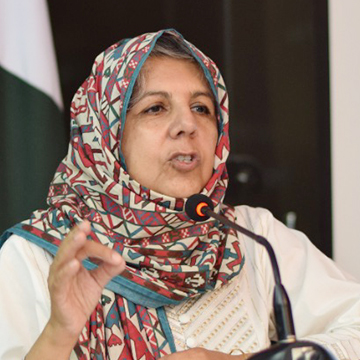
|
|
Prof. Dr. Samina Awan
Chairperson, Dept. of History, Allama Iqbal Open University, Islamabad
Chair of the Session
|
| |
|
Today we are here to discuss our legal stance on the accession of Junagadh and all other princely states. This is the spirit of alive nations and I also pay gratitude to all those who are looking for Junagadh state and revived the history. Furthermore, in research papers that were, presented by speakers of the session three things inspired me most. Firstly, we never learned much about Junagadh in our books but, Junagadh is in our hearts.
|
|
|
Secondly, awareness is being spread about the Junagadh issue that we had forgotten. Thirdly, the legal stance of Pakistan on Junagadh is being re-iterated. Similarly, Pakistan is an ideological state which will never forget all those states in which Muslims are suffering. In this busy schedule of contemporary times, we presented and highlighted the Junagadh issue in front of the whole community. We provided awareness, legal points of international law and gave comparisons with other states like Kalat, Bahawalpur, and Kashmir for understanding the real stance of the Junagadh state.
|
|
|
|
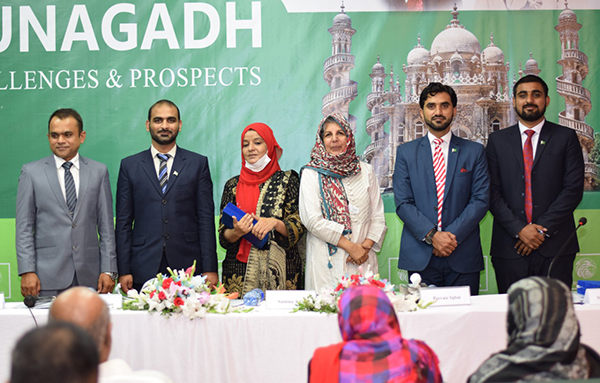
|
|
© 2021. All rights reserved.
|
|
|
|
|
|
|
| | | |